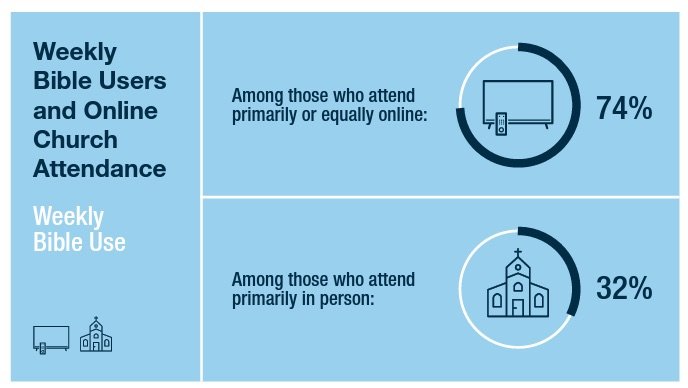The Myth of Online Attenders
I’m sure you’ve heard it. You may have even espoused it yourself.
“People who attend online aren’t committed.”
Or,
“People who attend online are less mature in their faith.”
Or even,
“If you attend online, you’re not going to grow.”
It’s so believed that when people hear about things like a “hybrid” approach to ministry – utilizing both the physical and the digital, in person and online – they are instantly dismissive. It is, to their thinking, missionally inferior.
This is, of course, false. In a previous blog, I highlighted research showing that those churches that embrace the virtual have higher virtual attendance, more total worship attendance, a greater likelihood to have grown in worship attendance, and, overall, higher giving rates.
Now, the American Bible Society (ABS) in its annual State of the Bible release has found that online worshipers lead in Bible reading frequency. Among those who attend primarily or equally online, 74% read the Bible at least weekly outside of that service. When you turn to in-person-only worshippers, that drops to only 32% who take up and read.
“This might seem surprising to those who see online church as a lesser experience, used by people who are less committed spiritually,” the ABS said in the report.
Yes, I imagine it will.
As I wrote in my book Hybrid Church, a digital revolution has taken place, and it has changed the way the world communicates to each other and relates with each other. A hybrid approach, mind you, does not embrace a purely digital approach, but rather simply incorporates the digital along with the physical, the in-person along with the online.
And it’s just as effective, if not more, in encouraging people to “take up and read.”
But what of those who would contend that the Church must not embrace many of these new forms of communication because, as Marshall McLuhan argued, the medium is the message, and in many cases, the mediums we might use to communicate would run counter to what we hope to achieve? As Felicia Wu Song writes, by using some mediums, the church “runs the risk of either naively promoting or remaining dangerously silent about digital habits that are slowly but surely distorting the very understanding and experience of soul formation and genuine Christian discipleship.”
Such sentiments are frequently voiced, but they often come across as just that – sentiments; meaning an attitude or opinion based on personal preference. As I’ve often told my graduate students, we must be very careful not to build theological fences around personal tastes. And I do sense that there are many who simply do not like it when a church embraces the digital world. They don’t want to read a book on Kindle, they don’t want to attend a class online, they don’t want to gather in virtual community, they don’t like the feel of an online campus.
Which, I might add, is fine. But don’t let what you like determine what is or is not valid. Speaking for myself, it doesn’t matter whether my sensibilities are more online or in person,
... I’ll take 74% reading the Bible over 32% any day of the week.
James Emery White
Sources
Diana Chandler, “State of the Bible: Online Worshipers Lead in Bible Reading Frequency,” Baptist Press, October 16, 2023, read online.
James Emery White, Hybrid Church, order from Amazon.
Marshall McLuhan, Understanding Media.
Felicia Wu Song, Restless Devices.


